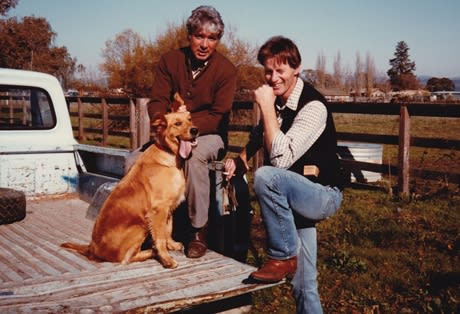Sam Shepard (most visible to the mainstream for his frequent portrayal of sheriffs, cowboys and politicians) was initially a playwright and writer. A child of the beatnik generation influenced by its many proponents — Kerouac's name pops up often — his unsentimental, rigidly male voice reflects on the violent, unstable nature of men on the Western front, who are presented in an ever-present state of flux and inner-conflict as vessels for law-breaking and moral debate.
His best friend and ersatz homosexual lover, Johnny Dark, wouldn't be recognizable to anyone outside of his immediate lexicon. Though he lived with Shepard for over a decade, having married the mother of Shepard's first wife, O-lan Jones, Dark stuck mostly with trades positions, endlessly corresponding and shooting the shit with his best buddy, which is where the impetus of Treva Wurmfeld's documentary, Shepard & Dark, stems from.
Retracing their past while preparing old letters for publication, the pair wax nostalgic about the longevity of their relationship, discussing the gradual physical deterioration of Dark's wife after suffering a burst blood vessel in her brain, as well as Shepard's decision to leave his wife for Jessica Lange.
Much of the discussion is flowery, pot-fuelled and pretentious, as can be expected from two men that prattle on about "finding themselves" like it's something external or tangible, but Wurmfeld's framing of it all as a love story adds a layer of intrigue and identity analysis.
Deli counter operator Johnny Dark discusses Shepard's need to control his world. Everyone around him is merely a cipher for his validation and presentation. Shepard describes relationships as illusory, noting how their presence merely masks the perpetual pain of loneliness.
Their collective observations about each other — in particular, Dark's analysis of Shepard's characterization of women in his writing — says a great deal more to the audience than their straightforward perceptions of self.
Wurmfeld is aware of this, bookending the story with Dark's observation that realizations of the self don't inspire change so much as they leave one wondering what to do with that knowledge. This observation speaks to the non-physical romantic relationship between these two documentary subjects, who eventually realize just how they use each other as vessels for recapturing the past.
Shepard would denote this as fate, whereas Dark would characterize Shepard's fatalistic perspective as a lazy justification of his flaws and past mistakes. Either way, the observation here is that everything ends.
(Films We Like)His best friend and ersatz homosexual lover, Johnny Dark, wouldn't be recognizable to anyone outside of his immediate lexicon. Though he lived with Shepard for over a decade, having married the mother of Shepard's first wife, O-lan Jones, Dark stuck mostly with trades positions, endlessly corresponding and shooting the shit with his best buddy, which is where the impetus of Treva Wurmfeld's documentary, Shepard & Dark, stems from.
Retracing their past while preparing old letters for publication, the pair wax nostalgic about the longevity of their relationship, discussing the gradual physical deterioration of Dark's wife after suffering a burst blood vessel in her brain, as well as Shepard's decision to leave his wife for Jessica Lange.
Much of the discussion is flowery, pot-fuelled and pretentious, as can be expected from two men that prattle on about "finding themselves" like it's something external or tangible, but Wurmfeld's framing of it all as a love story adds a layer of intrigue and identity analysis.
Deli counter operator Johnny Dark discusses Shepard's need to control his world. Everyone around him is merely a cipher for his validation and presentation. Shepard describes relationships as illusory, noting how their presence merely masks the perpetual pain of loneliness.
Their collective observations about each other — in particular, Dark's analysis of Shepard's characterization of women in his writing — says a great deal more to the audience than their straightforward perceptions of self.
Wurmfeld is aware of this, bookending the story with Dark's observation that realizations of the self don't inspire change so much as they leave one wondering what to do with that knowledge. This observation speaks to the non-physical romantic relationship between these two documentary subjects, who eventually realize just how they use each other as vessels for recapturing the past.
Shepard would denote this as fate, whereas Dark would characterize Shepard's fatalistic perspective as a lazy justification of his flaws and past mistakes. Either way, the observation here is that everything ends.




